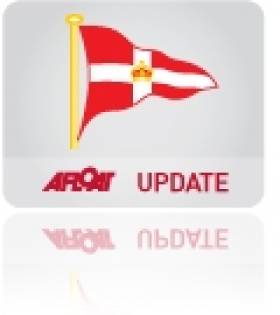Displaying items by tag: George
'Tales of the High Seas' - with Theo Dorgan
The Poet-adventurer Theo Dorgan comes to the RSt. George Yacht Club, Dun Laoghaire as an after dinner speaker to discuss his recent book, Time on the Ocean. This is an inspired description of how Dorgan flew to southern Chile and joined the crew of Pelagic Australis, a 70ft single mast yacht, for the voyage to Cape Town. Sailing more than 4,000 miles with 10 strangers involves immense difficulties, but Dorgan conveys with poetic simplicity his joy in facing this extraordinary challenge. The event "Tales of the High Seas" - with Theo Dorgan is a RSGYC Supper event. It's on Wednesday 7th September at the Royal St George and it is open to the public.
at 7.30pm. Tickets are €25 – includes supper – available from www.Paviliontheatre.ie Tel:-01 2312929
Ireland Fails to Conquer the World at Match Racing Challenge
A very experienced International line up, led by individual winner David Chapman (AUS), resulted in The World retaining the title they won last year. While the margin of victory was great, they were strongly pushed by a young Irish team who on paper were ranked far lower in the World Rankings. The final margin of victory was 29 points to 16.
An exciting part of the event's entertainment package allowed individuals to actually experience the racing as it happened by sailing on board with a team in the "Hot Seat" position. Edel Edwards, who lives in Dublin, had never sailed before but stepped into the "Hot Seat" on Saturday not knowing what to expect. She sailed with both George Kingston's team (IRL) in Flight 7 and Sam Pearson (GBR) in Flight 8, and said that the experience surpassed her expectations, "Both teams were really welcoming and being so close to the action was fantastic. It was one of the most amazing experiences of my life." Edel loved it so much she has decided to do an adult sailing course in the Royal St. George Yacht Club so that she can get out racing again soon.
Final Results:
1st David Chapman Australia World No. 43
2nd Sam Pearson Great Britain World No. 153
3rd Nicolai Sehested Denmark World No. 42
4th George Kingston Ireland World No. 877
5th Marty O'Leary Ireland World No. 395
6th Robbie Allam Great Britain World No. 79
7th Ben Duncan New Zealand World No. 200
8th Darragh O'Connor Ireland World No. 1323
9th Ben Scallan Ireland World No. 1674
10th John Downey Ireland Unranked





























































